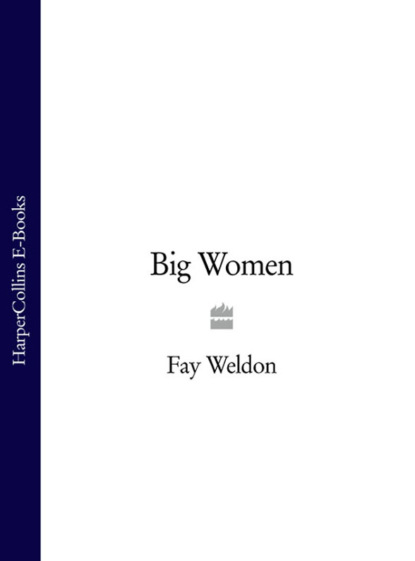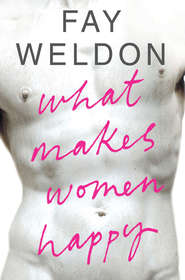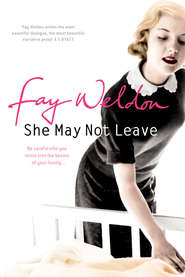По всем вопросам обращайтесь на: info@litportal.ru
(©) 2003-2024.
✖
Big Women
Автор
Год написания книги
2018
Настройки чтения
Размер шрифта
Высота строк
Поля
‘Men have art, women have babies,’ said Layla. ‘That’s what is said by men, if a woman takes up a brush or a pen. Ballet dancers are allowed, of course, because women have always danced before men, to entice them: and singers, because mothers sing lullabies.’
Nowadays few mothers sing to their children to lull them to sleep. Rather they read the little ones stories to develop their intellects. It’s all uppers, not downers, for the growing child. When adulthood is reached, the opposite occurs. Soothe and lull, soothe and lull: more sleep less stress.
Stephie said nothing. She was pale.
‘Of course great female artists exist,’ said Alice. ‘But they are hidden from history. They have always existed. Patriarchy denies them.’
‘There’s Austen and Brontë,’ said Zoe, always one for an impartial truth.
‘Dead,’ said Layla. ‘Only when women are dead do they enter the canon as honorary men. And what are those particular stories but schoolgirl fodder? Marry or starve with Austen: dive into masochism with the Brontës. Mad Mrs Rochester in the attic pays the price for sexual desire. How are you doing, Stephanie? How are Hamish and Daffy getting on with the coffee?’
‘Just fine,’ said Stephie. ‘Just fine. Can we consider the double bind of the working wife? When I’m at home I have to pretend I don’t go out to work. No tales of office life can be told. I certainly can’t let on that I enjoy it. When I’m at work I have to pretend I don’t have a home. No one there even knows I have children. I wouldn’t get promotion if they did. Employees want your full attention, husbands want your full attention. What’s a woman to do?’ (Well, what changes? But that’s another story.)
‘What about the children?’ asked Zoe primly. ‘Don’t they deserve your full attention? Otherwise, why have them? I think it should be husbands first, children next, employers third.’
‘Shut up, Zoe,’ said Layla. ‘Everyone knows you’re miserable at home.’
‘Life without any of them is possible,’ said Alice. ‘Spouseless, childless, self-employed – free.’
‘But how do we compel men to let us in?’ demanded Stephie. ‘If I get a rise I’m accused by my colleagues of taking the bread out of the mouths of family men. I am meant to turn the offer down. If I come home and say “goody-goody, I got a rise”, my husband says I’m a castrating woman. My earning threatens his male dignity. He fears impotence. He has his revenge.’
‘Well,’ said Layla, ‘if you didn’t insist on calling him “my husband” all the time and not “fucking Hamish” he might be less inclined to role-play.’
‘I am universalising’, said Stephie, ‘from my sample of one. I’m entitled.’
‘Stephie’s going to cry,’ said Zoe. ‘Where’s Daffy?’
‘What upsets me,’ said Stephie, ‘is that some women are just constitutionally incapable of sisterhood. What are we to do about that?’
Upstairs in the marital bedroom the bed began to squeak. The sound could be heard in the room below. Sexually open as all tried to be, and believed they were, embarrassment descended on those in the room below. Even Layla did not know what to say.
Meanwhile in the Youth Hostel, at the back of Tottenham Court Road, Brian asked Nancy to wash his socks.
‘Better wash these now, Nancy,’ he said. ‘I’ll need them tomorrow.’
Nancy took the socks as he peeled them off and handed them to her. They were warm, damp, too thick for the weather, and dirty white. It did not occur to her to say ‘wash them yourself’. It was not customary, in those days, for women to say such things. It was a seller’s market, men being a scarce commodity: men paid no piper but still called the tune.
These days the demographical tables have turned; there are more young men than young women in the world – medical care and life-friendly wars ensure their survival – and women have learned the art of the cartel. They know well enough that if they stare blankly and shake their head so will all the other women down the line. Socks get thrown away, not washed. Manufacturers ensure that washing machines lose them, or remove colours unevenly, and render them shapeless. The life expectancy of the sock falls and falls.
‘OK,’ said Nancy, cheerfully, years ago.
Myth had it that men were hopeless at domestic tasks. The logic was thereby sustained that men should do what they were good at – creating art, mending the car, contending with the outside world, bringing new ideas into the home, disciplining the children, earning, and so forth – and that women should do what they were good at – cooking, washing, having children, nurturing, soothing, consoling, and being flattered by male sexual attention, and so on. Step outside these roles and both were in trouble: women would be labelled shrill, aggressive, slut, nymphomaniac, and worst of all simply unfeminine: terms of opprobrium for men were in short supply. On the queer side, a bit of a pansy, was just about the best that could be done.
Anyway, here’s Brian saying, ‘And be sure to get all the soap out of them. If you don’t they stay stiff. You know how I hate that,’ and Nancy happily saying, ‘I’ll be careful,’ as she potters off to the wash-room to do the socks in the washbasin.
She even sings ‘Greensleeves’ as she goes, so pleased she is to be in England’s green and pleasant land, no matter how domestic tasks pursue her across the oceans.
Squeak, squeak, squeak. Layla wonders if Daffy has bothered to take her boots off, and if not, how Hamish will manage to find an entrance, because without first unlacing the boots how will he get the boiler suit off her, its legs being tapered.
Oh, happy days, when contraception first arrived, and no one thought of Aids, or other penalties of permissiveness, and sex was without ceremony and often instant. ‘Why don’t we do it in the street?’ Why not, indeed?
Squeak, squeak, squeak. In the faces down below was puzzlement rather than shock. Something was bothering them, beyond an abuse of sisterhood, beyond the expected villainy of men. Before an earthquake air pressure falls: animals sense it, and babies, and Theseus the Hero is reputed to have had the gift of predicting the stirring of the Titans.
This evening, in this room in Primrose Hill, London, the assembled women sensed something not quite amiss, something momentous, not yet happening, but about to happen: earthquake-style. Squeak, squeak, squeak.
Alice moistened her lips with her fragile virginal pink tongue and continued.
‘We must’, said Alice, ‘address the subject of women’s low self-esteem. If a tutor hands an essay to a group of students, male and female both, and says that essay is by a woman, men down-mark it but women down-mark it more. Say it’s by a man, and men up-mark it, but women up-mark it yet more. What further demonstration do we need that women can be their own worst enemy? So crushed that they collude in their own oppression, indeed, exacerbate it.’
‘We need role models,’ said Layla. ‘Strong, proud, effective women. But where are they? Where are the women big enough in soul and nerve to win this battle, to carry this revolution through?’
‘I see them here,’ said Alice. ‘In this room tonight.’
At that moment little Saffron woke and set up a wail. Squeal, squeal, squeal.
‘Shut that child up, can’t you?’ said Layla.
Revolution, folk wisdom has it, costs the lives of a generation, while it settles down, only to become the established order. After the French, the Russian, the American revolutions, millions died of hunger, disorder and the effects of sudden change, of too much attention to ideas and too little to the crops in the fields. Of course everyone dies anyway – and though it’s more soothing all round if we die at a ripe age, in our customary beds, the leaders of any revolution find the irritation a small price to pay for their principles. Why should the Women’s Revolution be different? Perhaps little Saffron sensed this, which is why she woke up so suddenly, and in so bad a temper.
Over in the Youth Hostel it occurred to Nancy that it was a strange thing to do, thus to wash Brian’s socks. They were not married, only engaged; he did not support her. Why was his convenience, his leisure, his rest, so much more important than hers? Was there not a great indignity in behaving as she did? What did she want Brian for, exactly? For the excitement and flattery when, as occasionally he did, he kissed her, some magic electricity passed from his lips to hers, and he focused on her central being, whatever that might be, and for once she had power over him. She wanted him for sex, in fact. Yet sexual fulfilment, in the interests of respectability, was what he denied her. The rinsing water finally ran clear and cold. Woollen garments should have a final rinse in cold water; then they dry softer. This is true, though hard on the hands.
In Primrose Hill the bed squeaks on; however Hamish found ingress to Daffy the results seem satisfactory. The squeaks stop for five minutes, then start again. Still Stephanie smiles on, though the others see the smile as fixed, not exactly happy.
‘Women have to learn to rise above the personal,’ says Alice, ‘to ignore their samples of one; otherwise they fall into the trap of male expectation. We must all accept that the personal is the political.’
There is a silence while they consider this. Squeaking from above, albeit coincidentally, stops as well, thus underlining the importance of the utterance.
‘The personal is the political,’ repeats Layla. ‘We need none of us be alone, ever again. That is amazing.’
‘Alice says these things,’ says Stephanie, ‘and then they drift off into oblivion. It mustn’t be allowed to happen. This brilliance must be recorded, printed, headlined. We need a newspaper.’
‘We need a publishing house,’ says Layla, ‘and a successful one. The thing to do is specialise in women’s classics. This way we will do everything we want: we will reclaim female history, women’s art, our self-esteem. We will record the ideas that shake the world. We will honour Alice. I work in publishing: it’s what I know how to do. Running these places is child’s play, so long as you don’t have to bother with male status-seeking.’
‘Let it be part newspaper, part publishing house,’ said Stephanie. ‘But for God’s sake can’t we forget about the past? Forget about art? We live in the present. We must find the women writers of today.’
‘You can forget that lot,’ said Layla. ‘They’re too busy being sensitive and pleasing men. Focus on the women writers of yesteryear. Anyone whose works are out of copyright, and you don’t have to pay. A guaranteed readership – everyone reads classics – and pure profit. This is an amazing window of opportunity.’
The squeak, squeak, squeak had started again.
‘What are you talking about, Layla?’ demanded Stephanie. ‘Window of opportunity! Profit! We’re talking about feminism.’
The squeaking stopped so abruptly that everyone had to try to work out what was going on. Perhaps the lovers, and not before time, had run out of steam. Saffron slept again, soothed by the ambient feeling of relief.
‘We can always talk about both,’ said Layla.
‘Talk all you like,’ said Zoe. ‘It’s money you need. Everything needs money. If I want a pair of shoes I have to ask Bull for the money, and he always says what’s wrong with the ones you’ve got on, they don’t let water, do they?’
‘Money for small things is always difficult,’ said Layla, ‘money for projects less so. I’ve always found the bank manager won’t lend you money for a crust of bread, but he will if you say you need a hat. I’ve got family money. I can call it in.’











